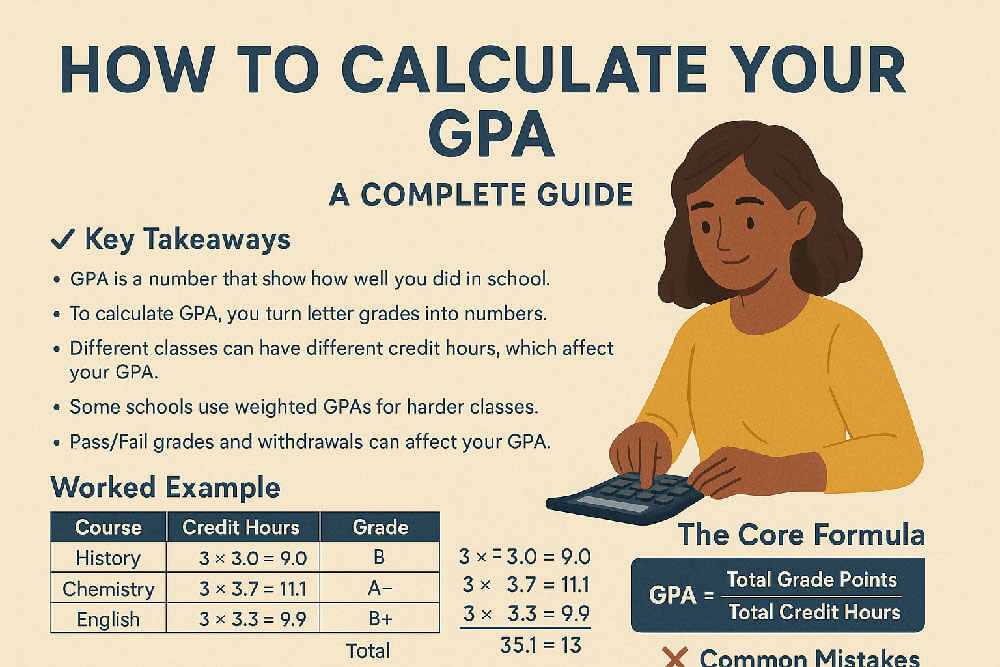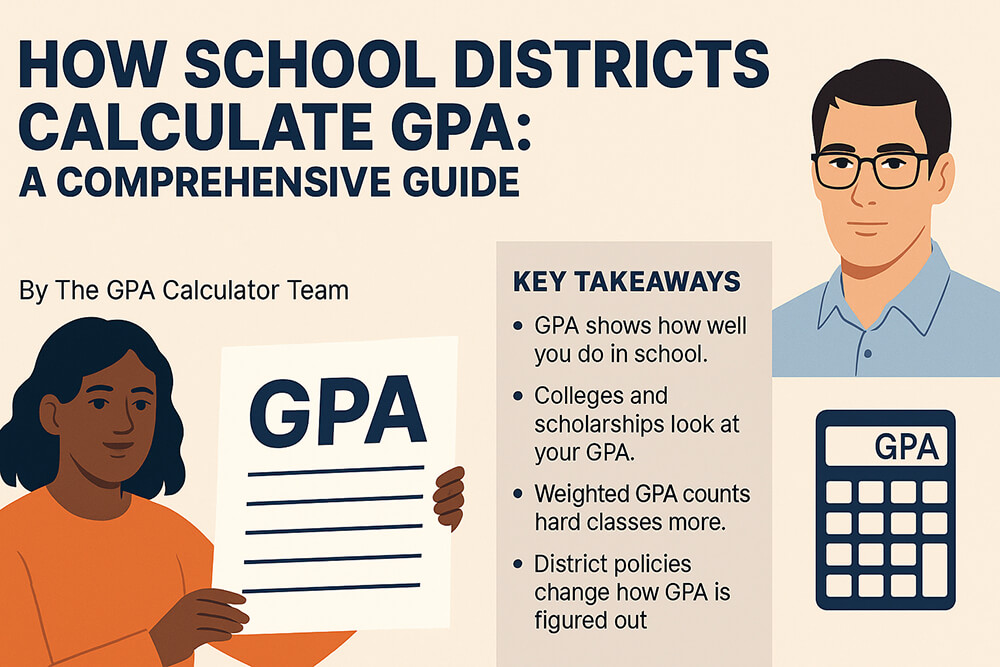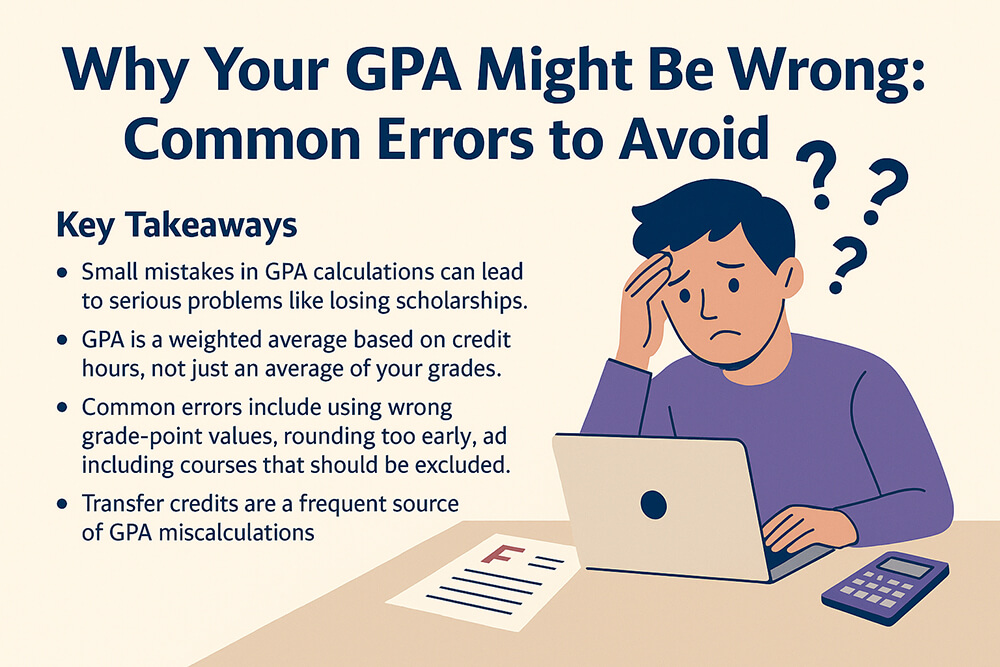Key Takeaways
| Feature | Description |
|---|---|
| What It Is | A Freshman-Year GPA Predictor is a tool that helps you estimate your future GPA. It uses your current grades, class types, and credits. |
| Why It Matters | Your freshman year GPA is the foundation for your entire high school record. A strong start opens doors to advanced classes and shows colleges you are a serious student. Research shows freshman year GPA is a powerful predictor of high school success. |
| How to Use | Enter your letter grades, course types (like regular, honors, or AP), and the number of credits for each class. The calculator then shows your potential weighted and unweighted GPA. |
| Goal Setting | Use the predictor to see how different grades in future assignments could change your final GPA. This helps you set clear academic goals. |
What is a Freshman-Year GPA Predictor?
A Freshman-Year GPA Predictor is a simple tool to see your possible grade point average. You enter your grades and classes. The tool then calculates your future GPA. This helps you understand where you stand academically. It gives you a clear picture of your performance early in high school. Using a GPA predictor helps you plan your studies better.
Why Your First Year's GPA is So Important
Your freshman year sets the foundation for your high school GPA. A good start makes it easier to maintain a high cumulative GPA later on. Colleges look at your grades from all four years. A strong freshman year shows them you are consistent and dedicated. It can also help you qualify for more challenging courses in your sophomore and junior years. You can perform a transcript audit later to ensure everything is accurate.
How to Use a GPA Predictor
Using a GPA predictor is straightforward. First, you list all your classes. Then, you enter the letter grade you have or expect to get for each class. You also input the number of credits each class is worth. Finally, you select the class type, such as regular, honors, or AP. The calculator then does the math for you. It shows both your weighted and unweighted GPA. This gives you a clear guide on how to calculate your GPA.
Understanding the GPA Formula
The basic GPA formula is simple. You divide your total quality points by the total number of credits. Quality points are the numeric value of your letter grades. An A is usually 4 points, a B is 3, and so on. The formula helps you see exactly how your grades contribute to your overall average. A clear GPA formula guide can break down the steps for you.
Quality Points vs. GPA: What's the Difference?
Quality points are the building blocks of your GPA. Each letter grade you earn has a corresponding point value. For example, an 'A' in a regular class is worth 4.0 quality points. Your GPA is the average of these points across all your classes. So, quality points are for individual classes, while GPA is your overall score. You can learn more about quality points vs. GPA explained.
Converting Letter Grades to GPA Points
Each letter grade has a number value on a 4.0 scale. An 'A' is a 4.0, a 'B' is a 3.0, a 'C' is a 2.0, and a 'D' is a 1.0. An 'F' is worth 0 points. Some schools also use pluses and minuses, which can change the value slightly. For example, a B+ might be a 3.3. Knowing these values is key to calculating your GPA. A letter to point GPA conversion guide is a useful tool.
Weighted vs. Unweighted GPA Explained
An unweighted GPA is calculated on a standard 4.0 scale where all classes are valued equally. A weighted GPA gives extra value to more difficult classes, like honors or AP courses. This means an 'A' in an AP class might be worth 5.0 points instead of 4.0. This system rewards students for taking on tougher academic challenges. Understanding weighted vs. unweighted GPA is important for college applications.
How Honors and AP Courses Affect Your GPA
Honors and AP courses can boost your weighted GPA. Schools add extra points for these classes to reflect their difficulty. Typically, an honors class adds 0.5 points, and an AP class adds 1.0 point to the grade value. So, an 'A' in an honors class becomes a 4.5, and an 'A' in an AP class becomes a 5.0. This GPA weighting guide for honors/AP can help you see the impact.
Understanding the 5.0 GPA Scale
The 5.0 GPA scale is used for weighted GPAs. It allows students to earn a GPA higher than 4.0 by taking advanced courses. On this scale, an 'A' in an AP or IB class is worth 5.0 points. An 'A' in an honors class is often a 4.5. This scale helps colleges see which students challenged themselves with a tougher course load. A 5.0 GPA scale guide provides more detail.
Common Myths About Weighted GPAs
One common myth is that colleges only look at weighted GPAs. In reality, many colleges recalculate your GPA using their own system. Another myth is that you should take as many AP classes as possible. It is better to get a good grade in a regular class than a poor grade in an AP class. It is important to find a balance. These weighted GPA myths debunked can clear up confusion.
How Different School Districts Calculate GPA
Every school district can have its own way of calculating GPA. Some use a 4.0 scale, while others might use a 5.0 or even a 6.0 scale for weighted grades. Some schools give extra weight for honors classes, while others do not. It is important to know your school's specific policy. This knowledge helps you use the GPA predictor accurately. You can learn more about how school districts calculate GPA.
How Credit Hours Change Your GPA
The number of credits a class is worth can impact your GPA. A class with more credits has a bigger effect on your overall average. For example, a good grade in a 1-credit class will raise your GPA more than the same grade in a 0.5-credit class. The GPA predictor takes this into account. A credit hour weighting GPA guide explains this in more detail.
What About Pass/Fail Classes?
Pass/Fail classes usually do not affect your GPA. If you pass, you get the credit, but it does not get a letter grade. If you fail, it might show up as an 'F' and hurt your GPA. The rules can vary by school. It is always a good idea to check your school's policy. Understanding how pass/fail grades impact your GPA helps you make smart course choices.
Avoid These Common GPA Calculation Mistakes
A frequent mistake is not using the correct weight for honors or AP classes. Another error is forgetting to include all your classes in the calculation. Some students also mix up weighted and unweighted scales. Using an online predictor helps you avoid these issues. Being aware of common GPA calculation errors to avoid ensures your result is accurate.
The Issue of GPA Inflation
GPA inflation means that the average GPA of students has been rising over time. This can make it harder for colleges to tell top students apart. It also means that a high GPA is more common than it used to be. Because of this, colleges also look at the difficulty of your courses and your test scores. The topic of GPA inflation vs. deflation is an important one in college admissions.
Using a Combined GPA Calculator
A combined GPA calculator is a very useful tool. It can show you both your weighted and unweighted GPA at the same time. This is helpful because some colleges look at one, while others look at the other. Seeing both numbers gives you a complete view of your academic standing. A weighted vs. unweighted GPA calculator is perfect for this.
Frequently Asked Questions (FAQ)
What is a good freshman year GPA? Many students aim for a GPA of 3.5 or higher during their freshman year. However, colleges also like to see improvement over time, so a slightly lower GPA isn't the end of the world.
How do I use a freshman GPA predictor? You enter your courses, grades, credits, and class types (regular, honors, AP). The calculator then estimates your semester or year-end GPA on both weighted and unweighted scales.
What is the difference between weighted and unweighted GPA? An unweighted GPA is on a 4.0 scale and treats all classes equally. A weighted GPA gives extra points for harder classes like honors and AP, often using a 5.0 scale.
Can I calculate my GPA for just one semester? Yes, you can use a GPA predictor to calculate your GPA for a single semester. Many schools, like those on a trimester system, require specific calculators like a trimester GPA calculator.







